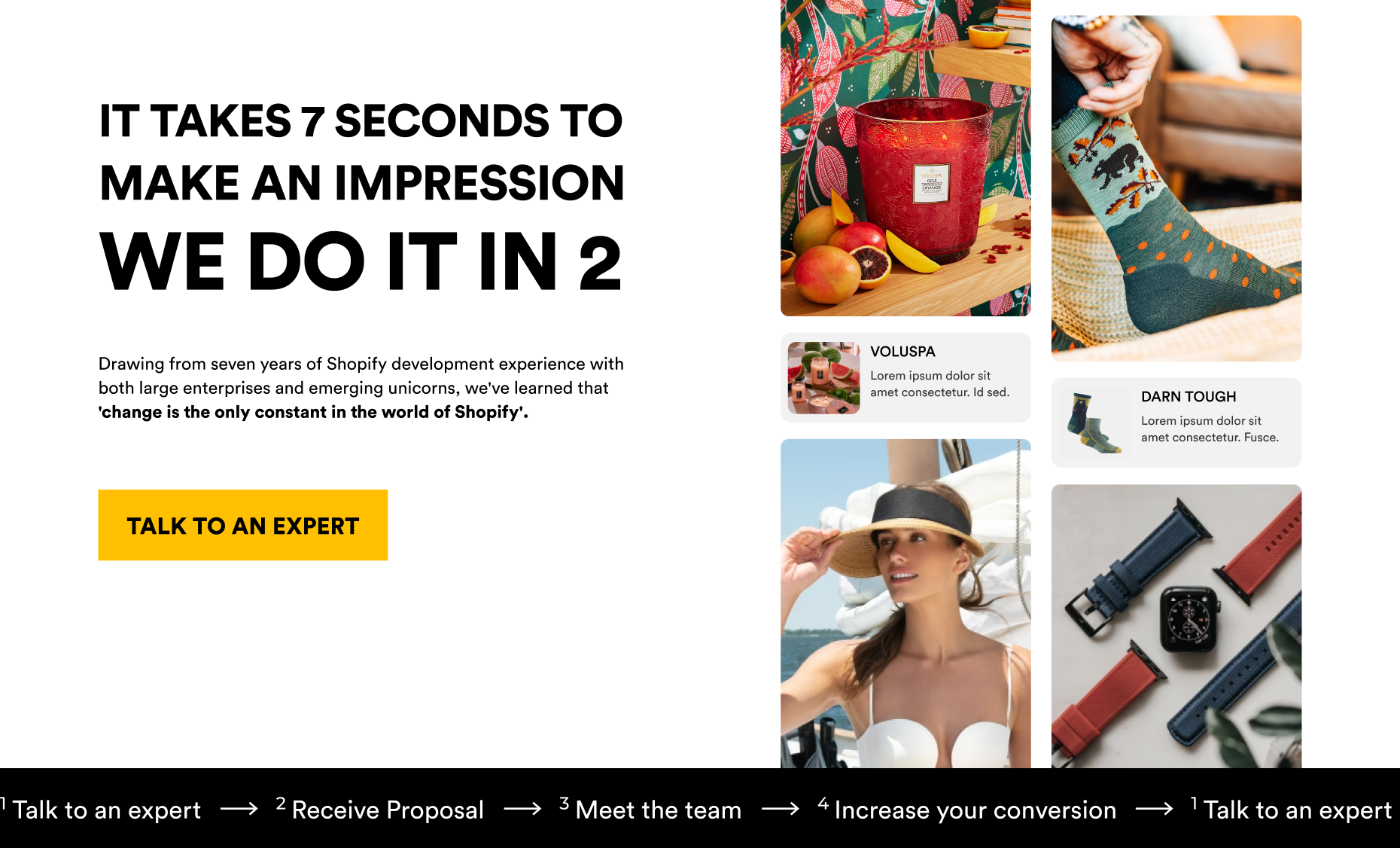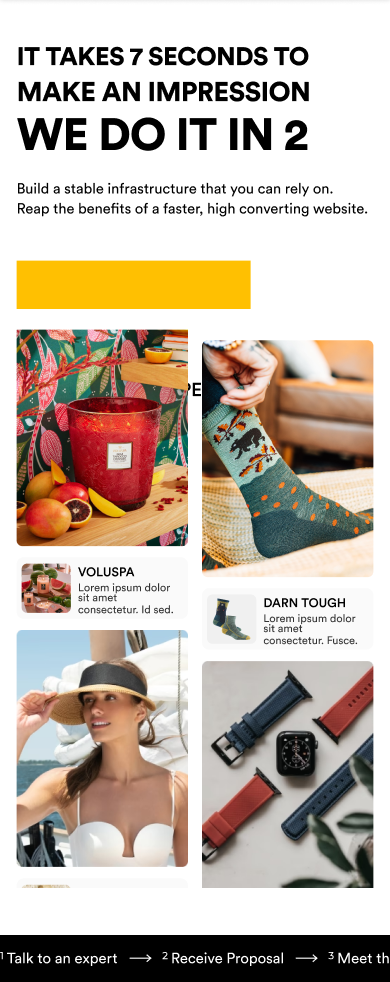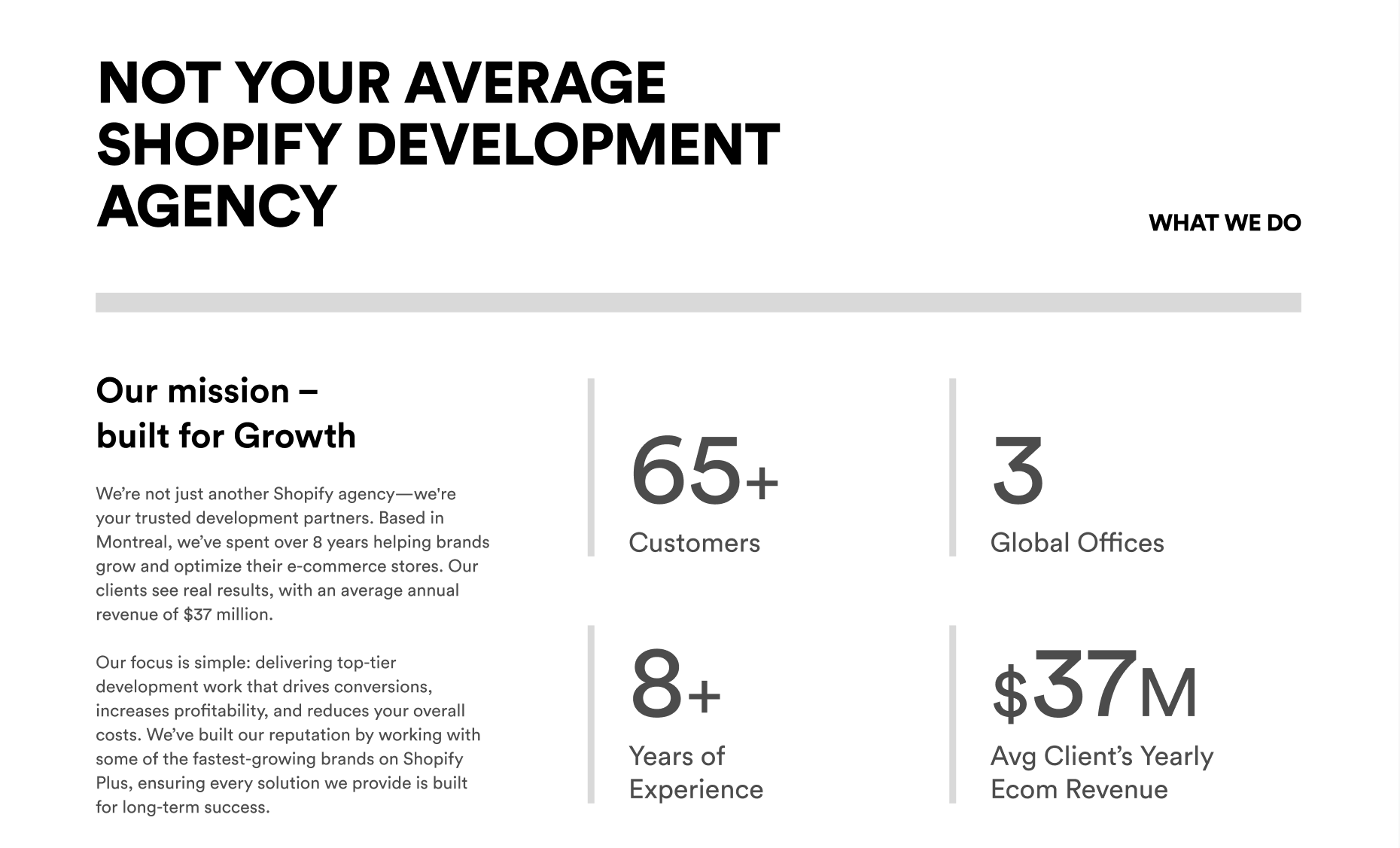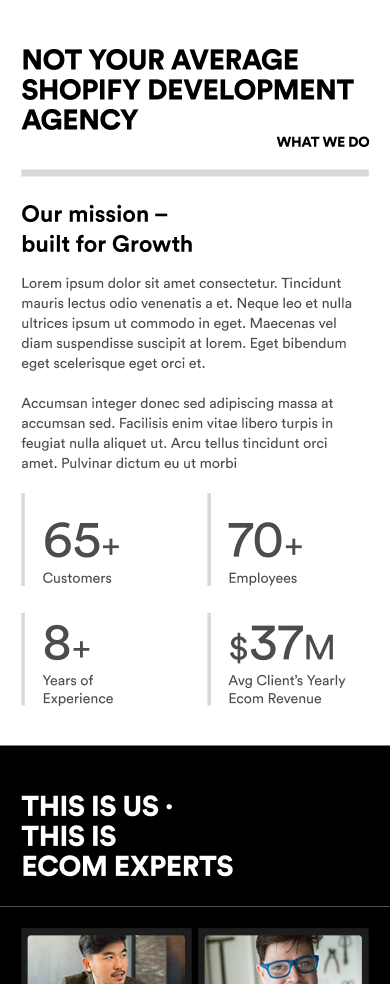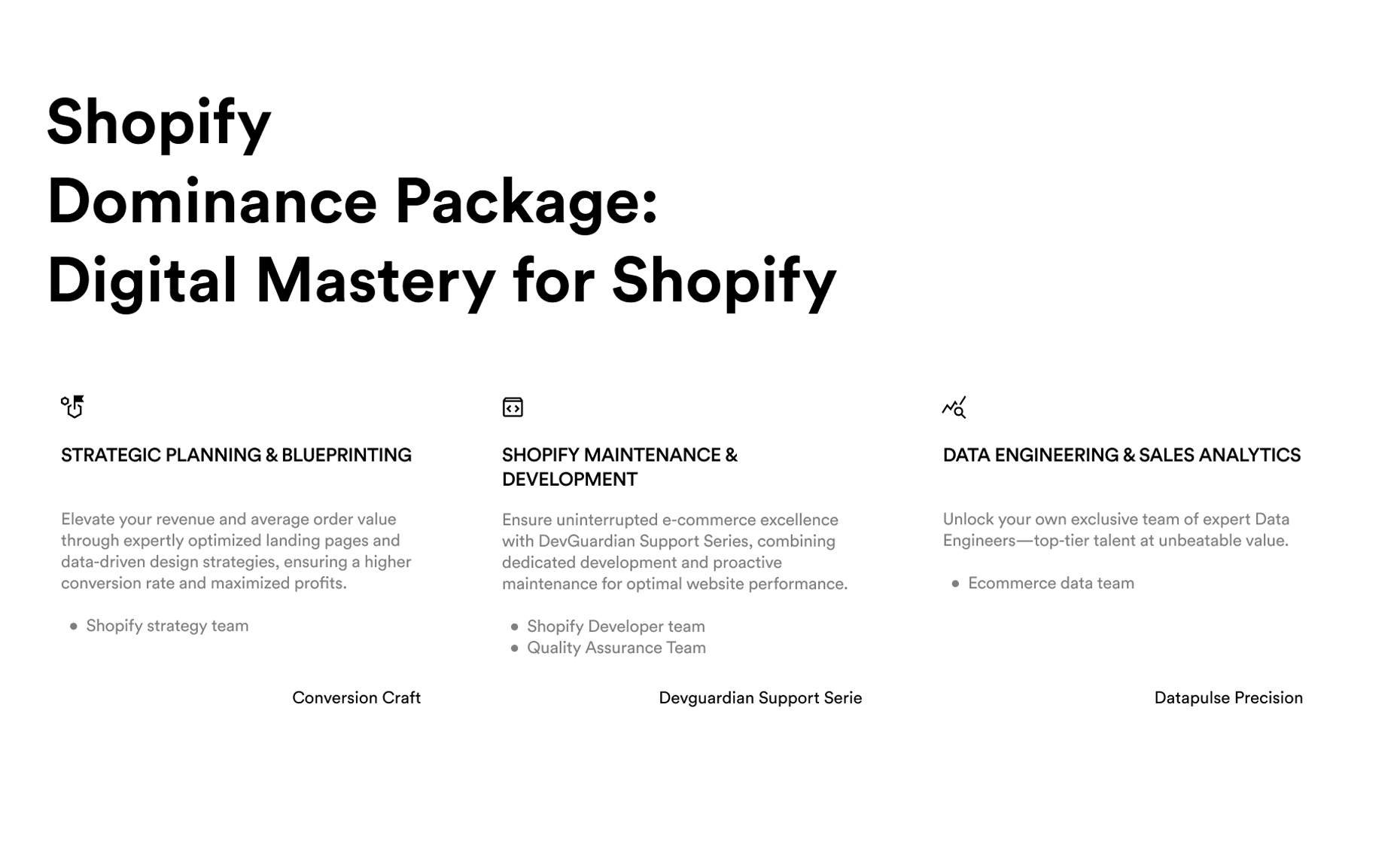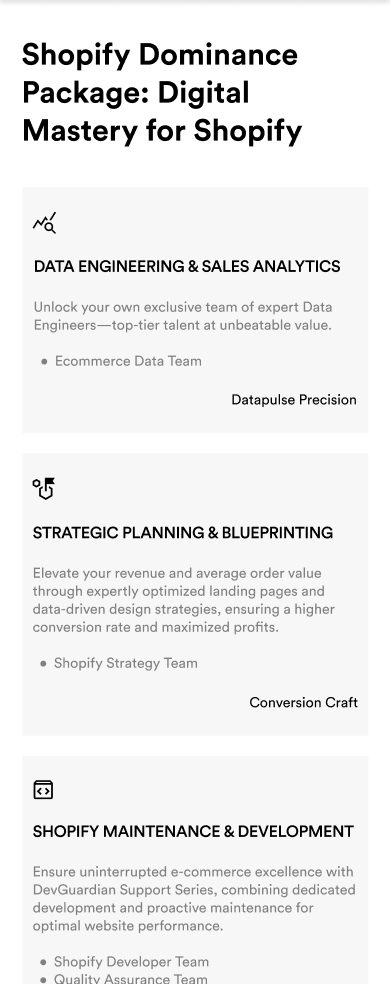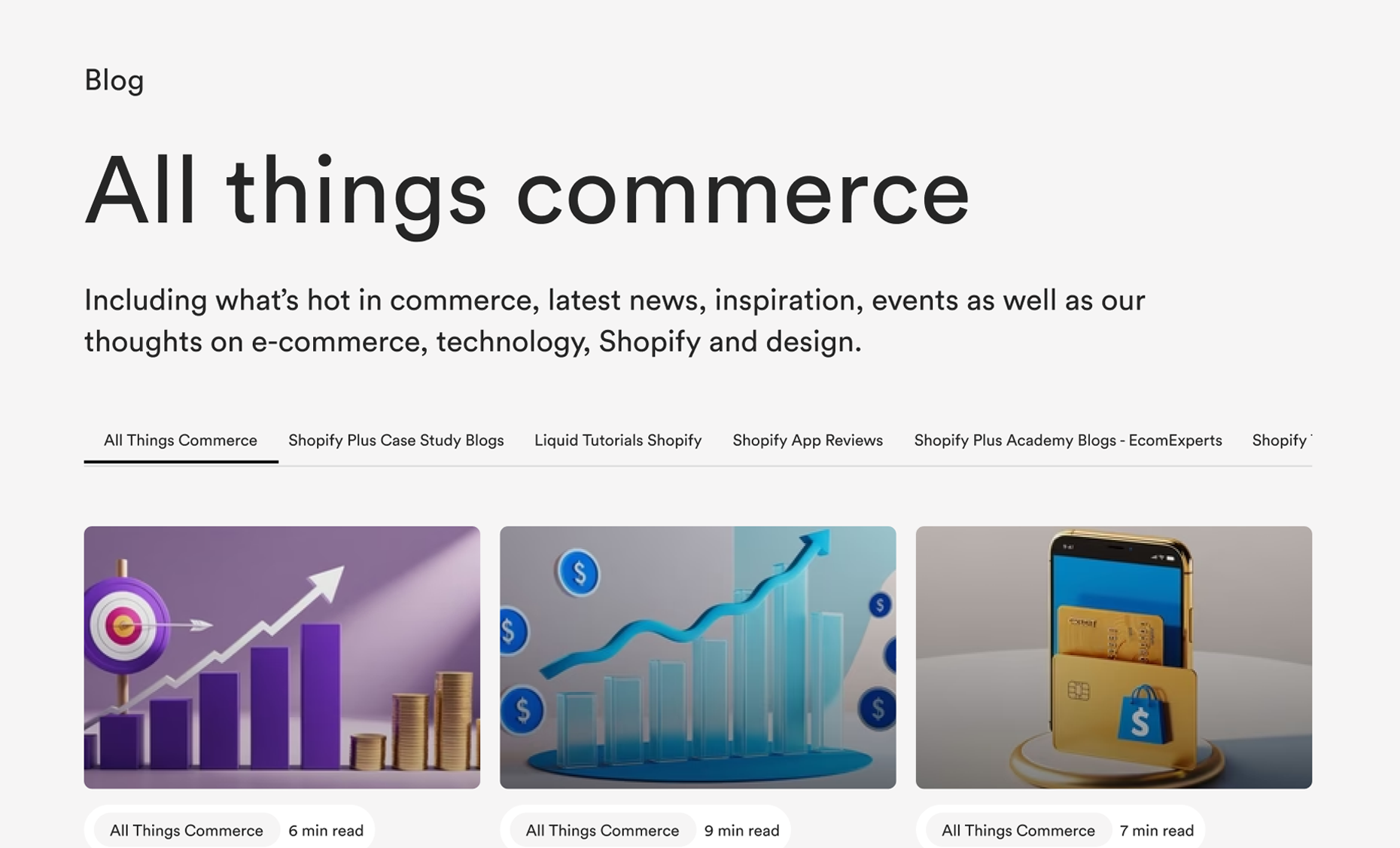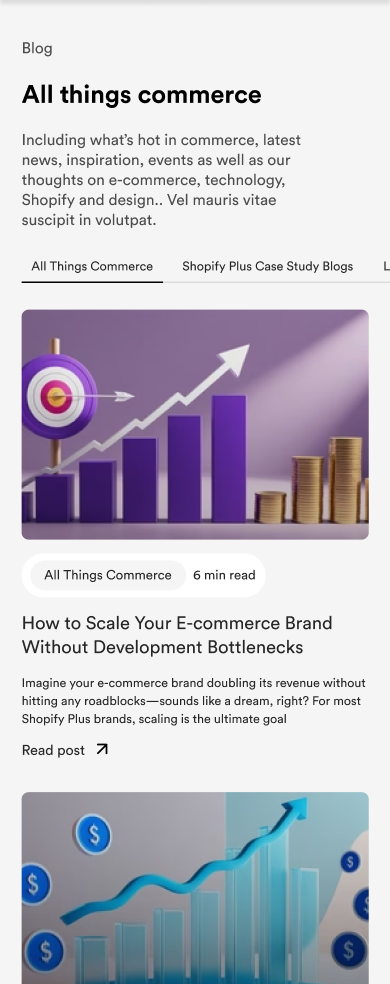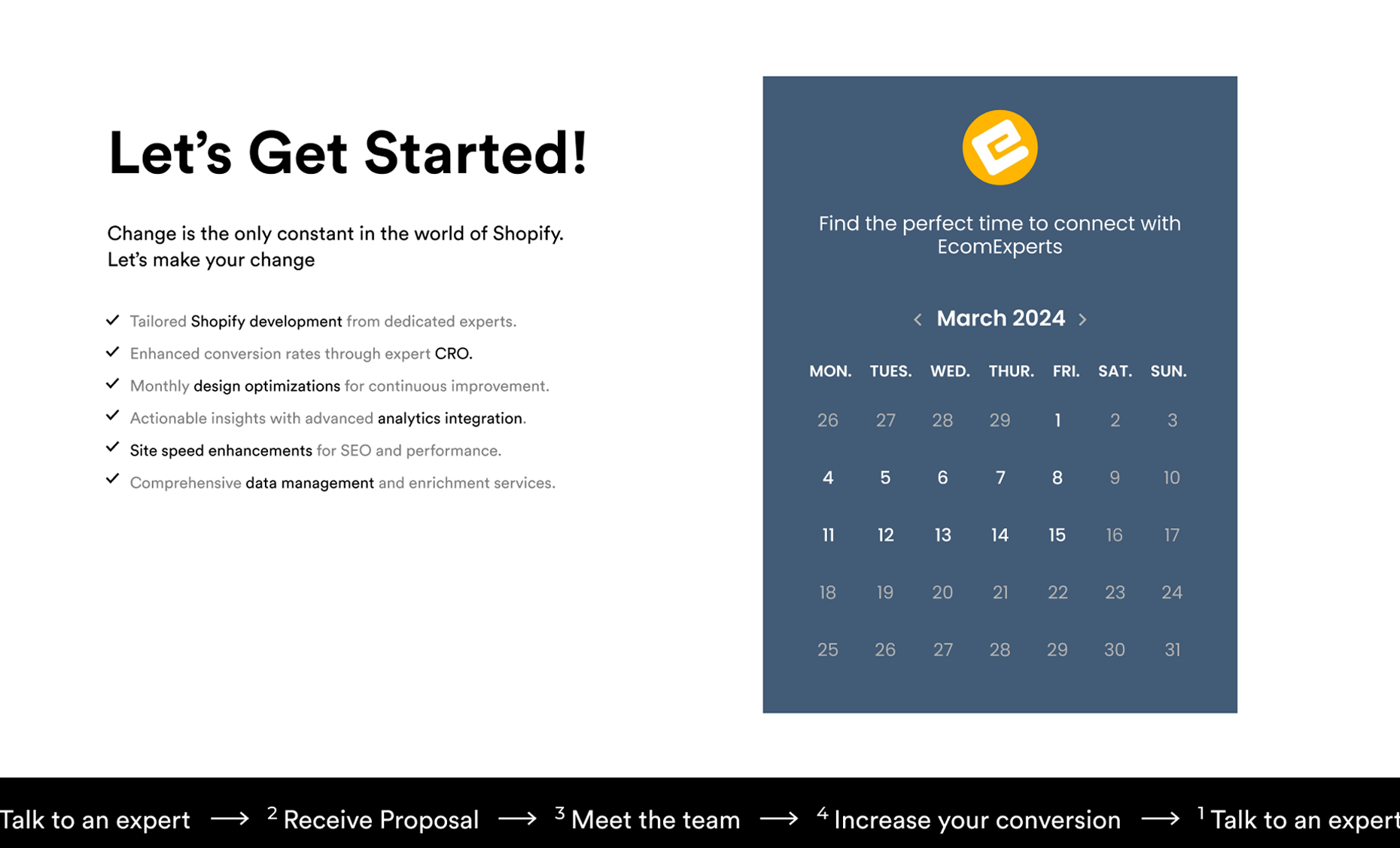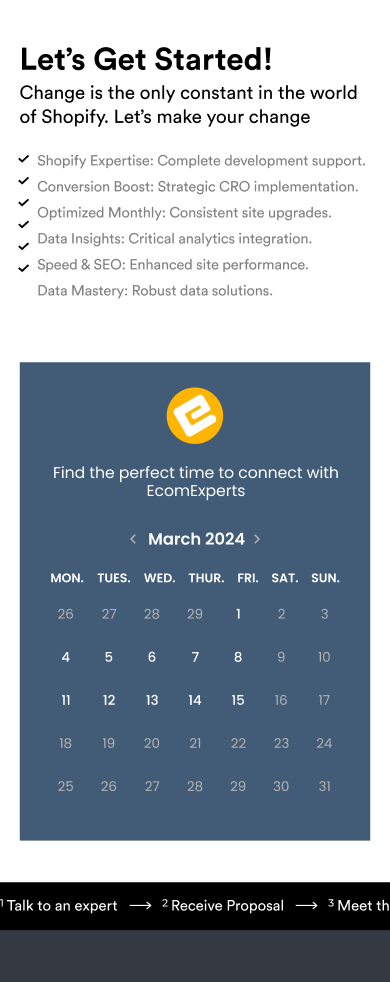Scaling a Shopify store isn’t just about adding new products or running flashy marketing campaigns. It’s about making sure your store has the tech muscle to handle more traffic, more sales, and bigger goals. And here’s where most growing brands hit a wall: development.
Suddenly, every update feels like a bottleneck. A simple tweak to your checkout page takes weeks. You know you need help—but now you’re stuck with the million-dollar question:
“Should I hire an in-house developer or work with a Shopify development agency?”
This isn’t a small decision. The wrong call can cost you time, money, and momentum. The right one? It can supercharge your growth and unlock possibilities you didn’t even know existed.
Think about it: do you want someone embedded in your team who understands every detail of your store, or do you need a squad of specialists ready to tackle complex challenges at scale? Or maybe the answer lies somewhere in between.
In this guide, we’ll break it all down:
- What an in-house developer brings to the table—and where they might fall short.
- How a Shopify development agency can help you scale faster, smarter, and without the headaches.
- The key factors to consider when deciding what’s best for your brand.
By the end, you’ll have the clarity to make a decision that works for your business—and your bottom line. Let’s get started.
Why This Decision Matters for Growing Brands
Here’s the thing about growth: it’s exciting… until it’s not. At some point, every Shopify store hits that “next-level” moment where what used to work just isn’t cutting it anymore. Pages need updates faster. Features get more complex. Customers expect lightning-fast experiences, and suddenly, your current setup feels like it’s stuck in second gear.
This is where the in-house vs. agency decision becomes crucial. Why? Because scaling your e-commerce business is only as smooth as the systems and people behind it.
What’s at Stake?
When you’re scaling, every development delay or misstep doesn’t just cost you time—it costs you revenue. Imagine:
- A new product launch is delayed because your developer is juggling too many tasks.
- Your site is speed-dragging, frustrating customers, and tanking conversions.
- A checkout optimization project stuck in limbo, leaving thousands of dollars on the table.
Scaling isn’t just about handling growth; it’s about staying ahead of it. And if your development setup can’t keep up, you’re leaving your customers—and your competitors—an opening.
Why the Right Choice Makes All the Difference
Let’s be clear: this isn’t about picking the cheapest or fastest solution. It’s about making a strategic decision that aligns with your business goals.
- Scalability: As your store grows, your development needs will expand too. Are you set up to handle that?
- Speed: In e-commerce, every second counts. The right setup ensures you can implement updates, fix issues, and launch features without bottlenecks.
- Expertise: Scaling requires specialized knowledge—site speed optimization, CRO, and advanced integrations. Are you relying on someone who can handle all of that, or are you limiting yourself?
Now that we’ve established why this decision matters, let’s dive into the specifics. First up: in-house developers—what they bring to the table, where they shine, and the challenges that come with hiring one.
In-House Developers: The Pros and Cons
Hiring an in-house developer can feel like the ultimate power move. They’re right there, embedded in your team, ready to jump in at a moment’s notice.
But while having someone in-house sounds ideal, it’s not always the perfect solution—especially for growing Shopify brands with evolving needs. Let’s break it down.
The Advantages of In-House Developers
-
Exclusive Focus on Your Brand
An in-house developer knows your store inside and out. They’re familiar with your products, customers, and the nuances of your business, allowing them to make quick, informed decisions. -
Direct and Immediate Communication
No waiting for emails or scheduling meetings—they’re just a Slack ping or a quick office chat away. This level of accessibility can be a game-changer when something needs to be fixed yesterday. -
Complete Control Over Development
You dictate priorities, timelines, and processes. This hands-on control allows you to adjust projects on the fly without negotiating with an external team.
The Challenges of In-House Developers
-
High Costs
Let’s talk numbers: the average salary for an experienced Shopify developer in the U.S. is around $90,000+ per year (source), and that’s before you factor in benefits, bonuses, and training. For many growing brands, this is a steep upfront investment. -
Limited Skillset
Even the best developers have their limits. One person might excel at front-end tweaks but struggle with advanced integrations, speed optimization, or app development. For complex needs, you may end up outsourcing anyway—adding to your costs. -
Scalability Constraints
One or two developers can only do so much. As your store grows, the demands on their time and expertise increase, leading to burnout, delays, and missed opportunities.
Hiring an in-house developer works best for brands with consistent, predictable development needs—not for those scaling rapidly or needing specialized expertise.
Is an In-House Developer Right for You?
If your Shopify store requires frequent, day-to-day maintenance and small updates, hiring in-house can be a great fit. But if your growth demands a wide range of technical skills or fast turnarounds, relying solely on one person might hold you back.
Shopify Development Agency: The Pros and Cons
Partnering with a Shopify development agency is like having an all-star team in your corner.
Instead of relying on one person, you get a crew of specialists with expertise in everything from speed optimization to advanced integrations. But, as with anything, it’s not a one-size-fits-all solution. Let’s unpack the pros and cons.
The Advantages of a Shopify Development Agency
-
Diverse Expertise at Your Fingertips
Agencies don’t just bring one developer to the table—they bring a team. From front-end designers to back-end developers, you get access to specialists who’ve worked on hundreds of Shopify stores. Whether it’s custom app development, complex integrations, or CRO (conversion rate optimization), they’ve got it covered. -
Cost-Effective Scaling
With an agency, you only pay for what you need. Whether it’s ongoing maintenance or one-off projects like site speed optimization, you’re not locked into the long-term costs of an in-house hire. Plus, many agencies offer tiered plans (like Ecom Experts’ hourly development packages) that let you scale services as your business grows. -
Faster Turnaround Times
Need to launch a new feature or fix a critical issue? Agencies have the manpower to tackle multiple projects simultaneously, so you’re not stuck waiting weeks for updates. -
Industry Best Practices
Agencies work with a wide variety of Shopify brands, which means they’re up to speed on what’s working—and what’s not. This insight gives you a strategic advantage, especially when competing in a crowded market.
The Challenges of a Shopify Development Agency
-
Less Direct Control
Unlike an in-house developer, agencies work independently. While this frees up your time, it also means you’ll need to set clear expectations and maintain regular communication to keep projects aligned with your vision. -
Potential Communication Gaps
Misalignment can happen if communication isn’t strong. This can lead to delays or outcomes that don’t fully meet your expectations. Choosing an agency with a transparent process is critical to avoid this. -
Long-Term Dependency
Relying solely on an agency for all your development needs can make your business dependent on external resources. Over time, you may need to consider balancing agency support with internal capabilities to maintain autonomy.
Is a Shopify Development Agency Right for You?
If your brand is growing quickly and your development needs include advanced features, faster turnarounds, or scalability, an agency is often the best option.
Their specialized expertise and flexible services allow you to focus on what you do best—running your business—while they handle the technical heavy lifting.
Key Factors to Consider When Choosing
So, you’ve seen the pros and cons of both options, and now it’s decision time. But before you make the call, it’s essential to evaluate your brand’s unique needs.
Here are the key factors to consider when deciding between hiring an in-house developer or partnering with a Shopify development agency.
1. Budget
Let’s start with the elephant in the room: costs.
-
In-House Developer: The upfront investment is significant. Beyond the salary (averaging $90,000+ annually in the U.S.), you’ll need to factor in benefits, training, and equipment. If your store has consistent, predictable development needs, this might be a worthwhile investment.
-
Agency: Agencies offer more flexibility. You can pay per project or choose hourly packages tailored to your budget. For instance, Ecom Experts provides tiered plans, ensuring you only pay for the development hours you need. This is often a more cost-effective solution for growing brands.
Consider This: Do you have the budget to commit to a full-time hire, or would flexible, project-based costs better suit your growth stage?
2. Expertise Needed
What kind of development work does your store require?
-
In-House Developer: Great for day-to-day tasks like minor updates, troubleshooting, or basic theme customizations. However, most in-house developers have a limited range of expertise, which could be an issue if you need advanced features like custom app development or headless commerce.
-
Agency: Ideal for more complex needs. Agencies provide access to specialists in different areas—speed optimization, conversion rate optimization (CRO), custom integrations, and more. If your growth demands cutting-edge solutions, an agency is likely your best bet.
Consider This: Is your development work routine, or does it require specialized knowledge that one person might not have?
3. Scalability
Your development needs will grow as your store scales. Can your chosen solution keep up?
- In-House Developer: One or two developers might struggle to handle an influx of new projects as your store expands. Hiring additional in-house team members can quickly become expensive.
- Agency: Agencies are built for scalability. They can allocate more resources to your account as your needs increase, ensuring you’re never held back by bandwidth limitations.
Consider This: Is your current growth trajectory predictable and manageable, or do you anticipate needing rapid scaling support?
4. Speed and Turnaround Times
When updates and fixes are urgent, speed matters.
- In-House Developer: With someone in-house, small tasks can often be completed quickly. However, larger projects might still take time, especially if your developer is juggling multiple priorities.
- Agency: Agencies often have dedicated project managers and teams that can handle multiple tasks simultaneously, leading to faster turnarounds for bigger initiatives.
Consider This: Do you need quick fixes for smaller tasks, or do you need a team that can deliver complex projects on tight timelines?
5. Long-Term Goals
Think beyond the next 6-12 months. Where do you see your brand, and what kind of development support will you need to get there?
- In-House Developer: A good option if you want someone who becomes deeply embedded in your team and understands your brand’s nuances over time.
- Agency: Perfect for brands aiming for long-term growth with a mix of high-impact projects and ongoing support.
Consider This: Do you need a full-time team member to handle day-to-day tasks, or are you looking for a partner to help you execute a long-term scaling strategy?
What’s the Right Choice for You?
Here’s the truth: there’s no universal answer. Your decision depends on your budget, the complexity of your needs, and how quickly you’re scaling. But if you’re unsure, there’s always a third option—the hybrid model.
Hybrid Model: The Best of Both Worlds?
What if you didn’t have to choose? For many growing Shopify brands, a hybrid model—combining an in-house developer with the support of a Shopify development agency—offers the best of both worlds. It’s a solution that leverages the strengths of both options while minimizing their weaknesses.
What Is the Hybrid Model?
In this approach, you hire an in-house developer to handle day-to-day tasks and ongoing maintenance while partnering with a Shopify development agency for high-impact projects and specialized expertise.
Think of your in-house developer as the quarterback and the agency as your all-star support team. Together, they create a system that’s scalable, efficient, and ready to tackle any challenge.
Why the Hybrid Model Works
1. Day-to-Day Efficiency
Your in-house developer is embedded in your team, handling routine updates, minor bug fixes, and any immediate needs. They ensure your store runs smoothly daily.
2. Access to Specialized Expertise
When it’s time for a major upgrade—like implementing a custom app, optimizing your site speed, or overhauling your checkout process—the agency steps in with its team of specialists. This allows you to tap into advanced skills without overburdening your in-house developer.
3. Scalable and Flexible Support
Agencies bring scalability to the table. If your business experiences a seasonal rush or takes on a large project, it can allocate more resources without requiring you to hire additional staff.
4. Cost Efficiency
By focusing your in-house hire on core tasks and outsourcing complex or infrequent projects, you maximize your budget. You’re not paying a full-time salary for expertise you only need occasionally.
Challenges of the Hybrid Model
While the hybrid model is powerful, it does come with its own set of challenges:
- Coordination is Key: Communication between your in-house developer and the agency must be seamless to avoid misalignment. A dedicated project manager can help bridge this gap.
- Balancing Workloads: Ensure your in-house developer has a clear scope of responsibilities so they’re not stretched too thin while coordinating with the agency.
Is the Hybrid Model Right for You?
The hybrid model is ideal for brands that:
- Are scaling quickly but want to maintain some control in-house.
- Need specialized expertise for specific projects.
- Want to balance cost efficiency with flexibility.
The hybrid model isn’t just about getting the best of both worlds—it’s about building a system that grows with your business. And with the right agency partner, you can scale without limits while keeping your internal team focused and productive.
Why Ecom Experts is the Go-To Agency for Growing Shopify Brands
When it comes to scaling your Shopify store, you don’t just need a team—you need the right team. That’s where Ecom Experts comes in. As a trusted Shopify Plus Partner, we’ve helped growing e-commerce brands eliminate development bottlenecks, boost their performance, and unlock their full growth potential. Here’s why brands consistently choose us:
1. Specialized Shopify Expertise
We don’t just work on Shopify—we master it. Our team specializes in Shopify Plus development, covering everything from site speed optimization to advanced customizations. Whatever your challenge, we’ve likely solved it before.
- Site Speed Optimization: A faster store means happier customers and higher conversions. We’ve helped brands dramatically improve PageSpeed scores and reduce load times, no matter how complex their setup.
- Checkout Customization: From integrating Buy Now, Pay Later options to building dynamic upselling features, we make sure your checkout works for you.
- Custom App Development: Do you need a feature you can’t find? We’ll create it, tailored to your exact needs.
2. Flexible, Scalable Services
Every business is different, and we get that. Our services are designed to scale with you as you grow.
- Tiered Hourly Development Plans: Depending on your store's requirements, you can choose from 10, 20, or 40 dedicated hours per week.
- One-Time Projects: Tackling specific challenges like theme customization, speed optimization, or payment gateway integrations? We’re here for that too.
With Ecom Experts, you get exactly what you need—no unnecessary costs or extras.
3. Proven Results with High-Growth Brands
Our track record speaks for itself. Here’s what we’ve achieved for our clients:
- Eric Javits: This luxury fashion brand needed faster load times and improved customer experiences. We helped optimize their site speed from 51 to 92, leading to a significant increase in user satisfaction and conversions.
- Malbon Golf: Partnered with us to improve site performance and streamline workflows, achieving a 20% boost in conversions within months.
These aren’t just metrics—they’re real transformations for brands ready to scale.
4. Seamless Collaboration with Your Team
Whether you already have an in-house developer or are starting fresh, we seamlessly integrate into your workflow. From dedicated project management to transparent communication, we prioritize your goals at every step.
5. Trusted by Shopify Brands Like Yours
We’ve partnered with Shopify brands across industries—fashion, beauty, tech, and lifestyle. This diverse experience gives us a unique understanding of the challenges you face and the solutions you need to succeed.
At Ecom Experts, we’re not just developers—we’re your partners in growth. Whether you need ongoing support or help with a game-changing project, we’re here to make scaling smarter and faster.
Making the Right Development Choice to Unlock Your Brand’s Potential
Scaling your Shopify store is an exciting milestone—but it’s not without its challenges. Choosing between hiring an in-house developer and partnering with a Shopify development agency is one of the most important decisions you’ll make for your business.
To recap, here’s what we’ve learned:
- In-house developers offer exclusive focus, quick communication, and complete control, making them ideal for routine, day-to-day development needs.
- Shopify development agencies provide diverse expertise, faster turnarounds, and scalable solutions, making them perfect for high-impact projects and rapid growth.
- And for many growing brands, the hybrid model—combining the strengths of both—is the sweet spot, giving you flexibility and a balanced approach to scaling.
No matter which option you choose, the ultimate goal is the same: creating a seamless, high-performing store that drives conversions and keeps your customers coming back.
If you’re ready to scale your Shopify store without limits, Ecom Experts is here to help. Whether you need a partner for complex customizations, ongoing site optimization, or just an extra boost to handle growth, we’ve got the expertise and flexibility to make it happen.
Your brand’s growth is our priority—let’s build something extraordinary together.


